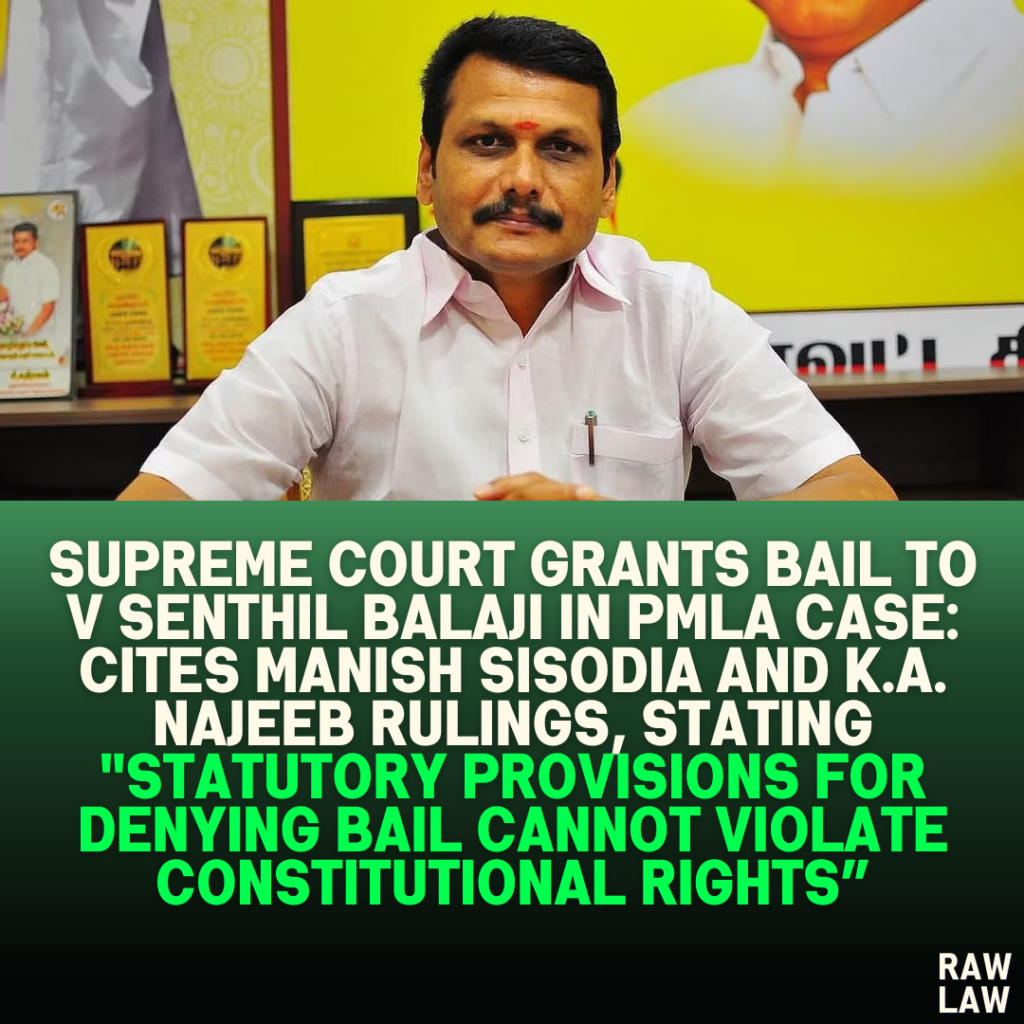Court’s Decision
The Supreme Court allowed the appeal and granted bail to the appellant, subject to stringent conditions. The court emphasized the prolonged nature of the trial under the Prevention of Money Laundering Act (PMLA) and observed that continued incarceration would violate the appellant’s right to a speedy trial under Article 21 of the Constitution.
Facts
The appellant, a former minister, was accused of collecting large sums of money by promising government job opportunities in the Transport Department between 2011 and 2016. The appellant was arrested in connection with an Enforcement Case Information Report (ECIR) for offenses under Section 3 of the PMLA. Several FIRs had been filed against him, citing offences under the Indian Penal Code and the Prevention of Corruption Act, making them scheduled offences under the PMLA. The appellant was arrested on June 14, 2023, and has been in custody since.
Issues
- Whether the appellant should be granted bail considering the prolonged nature of the trial under the PMLA.
- Whether the evidence presented, including the incriminating documents and witness testimonies, supports denying bail to the appellant.
- Whether the appellant’s continued detention violates his constitutional right to a speedy trial.
Petitioner’s Arguments
The appellant’s counsel argued that the investigation related to the scheduled offenses was completed and all relevant documents had been seized. They emphasized that the trial for the scheduled offenses would take years to complete due to the high number of accused and witnesses involved. The counsel relied on previous Supreme Court decisions, particularly the case of Manish Sisodia, to argue that bail should be granted due to the delay in concluding the trial. They also contended that the alleged proceeds of crime deposited in the appellant’s account were legitimate, originating from his salary as an MLA and agricultural income.
Respondent’s Arguments
The respondents, including the Enforcement Directorate (ED), argued that there was sufficient evidence to implicate the appellant in the job scam, which involved the collection of large sums of money for providing employment in the Transport Department. The respondents pointed to documents seized from the appellant’s premises, including a pen drive with detailed information on the amounts collected for various posts. They also expressed concerns that, if released on bail, the appellant could use his political influence to tamper with evidence and intimidate witnesses.
Analysis of the Law
The court examined the legal framework under the PMLA and the twin conditions for bail under Section 45. The court highlighted that while statutory restrictions exist for granting bail in such cases, constitutional courts have the discretion to grant bail when prolonged detention violates fundamental rights. The court also reiterated the right to a speedy trial as a vital element of personal liberty under Article 21 of the Constitution.
Precedent Analysis
The court referenced the cases of Manish Sisodia and K.A. Najeeb, both of which addressed the issue of prolonged pre-trial detention. The court in these cases held that statutory provisions for denying bail should not be used as a tool to violate an individual’s constitutional rights. The K.A. Najeeb case was particularly significant in discussing the harmonization of statutory restrictions with the constitutional right to a speedy trial.
Court’s Reasoning
The court reasoned that, given the complexity and scale of the case, the trial of the scheduled offenses could not conclude in the near future. The appellant had already been incarcerated for more than 15 months, and further detention would be a violation of his right to a speedy trial. The court also considered the evidence presented by the prosecution, finding no immediate reason to doubt its validity but concluded that stringent conditions could mitigate the risk of tampering with evidence or influencing witnesses.
Conclusion
The court concluded that the appellant’s continued detention was not justified given the delays in the trial process. Therefore, the court granted bail to the appellant, subject to several conditions, including the surrender of his passport and regular attendance before the relevant authorities.
Implications
The decision reaffirms the principle that bail is the rule and jail is the exception, especially in cases where trials are significantly delayed. It underscores the importance of balancing statutory restrictions on bail with constitutional protections for personal liberty and the right to a speedy trial. The judgment may set a precedent for similar cases under the PMLA and other statutes with stringent bail provisions.




Pingback: Delhi High Court Holds Respondent in Contempt for Willful Disobedience of Restraining Order: "Disobedience Must Be Deliberate and Intentional, With Full Knowledge of the Consequences"; Orders Respondent to Appear in Person for Sentencing Hearing
Pingback: Uttarakhand High Court Observes Unnecessary Adjournments Hinder Expeditious Disposal of Cases Under Section 138 of the Negotiable Instruments Act, 1881 - Raw Law